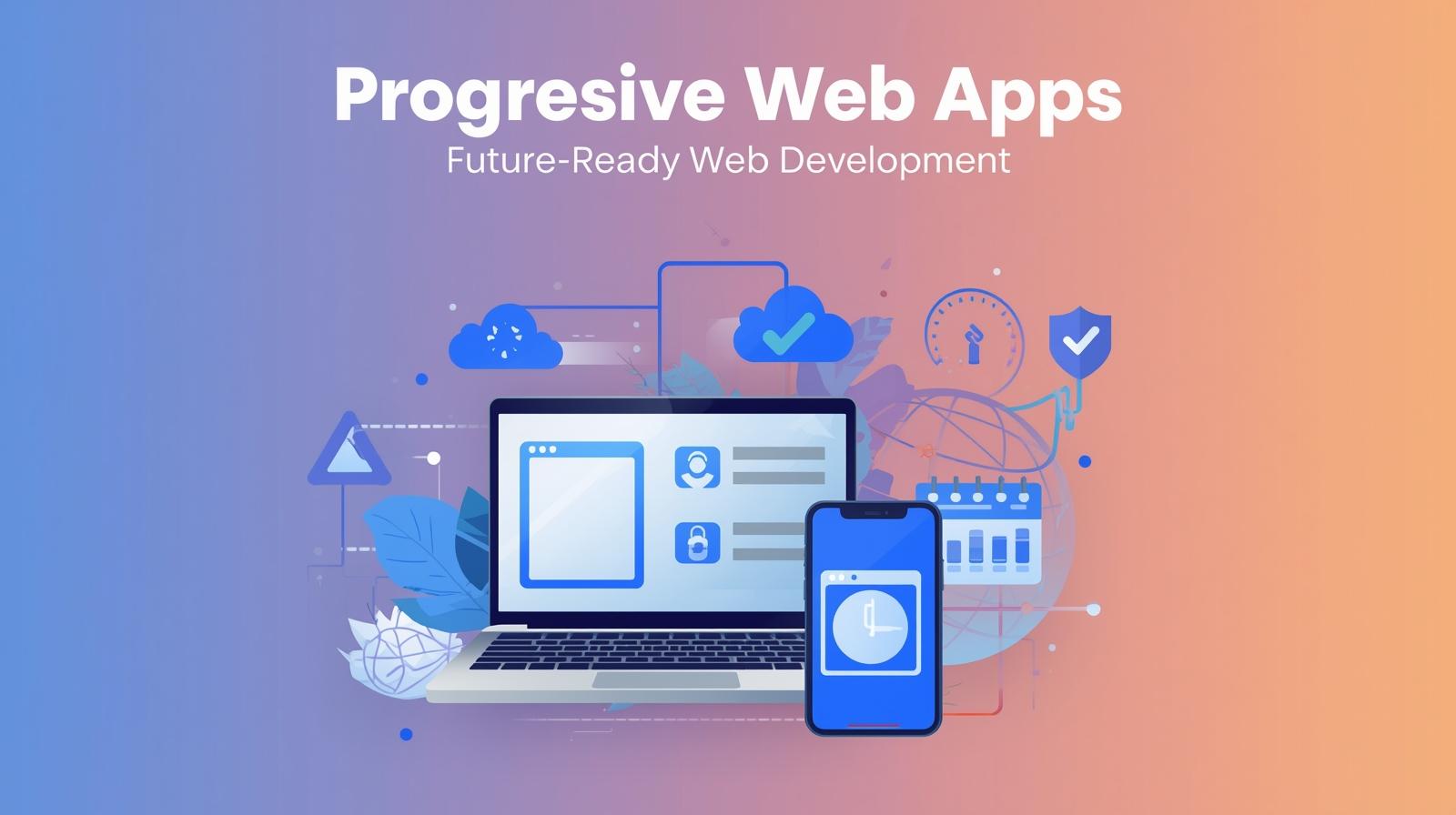Introduction:
The Digital Shift
The way users interact with businesses online has changed dramatically. With mobile-first browsing dominating the market, companies need solutions that deliver speed, reliability, and engagement. Traditional websites often lack advanced functionality, while native apps require high development costs and app store approvals. This gap led to the rise of Progressive Web Apps (PWAs).
What Are PWAs?
PWAs are web applications that:
- Run in a browser but feel like native apps.
- Offer features such as:
- Offline access
- Push notifications
- Home screen installation
- Eliminate the need for app store downloads.
Why Businesses Need PWAs
- Lower Development Costs: One codebase for web and mobile.
- Broader Reach: Accessible on any device with a browser.
- Higher Engagement: Faster load times and app-like experience.
The User Behavior Factor
- Mobile users spend most of their time in apps, not browsers.
- Convincing users to download an app is challenging.
- PWAs solve this by offering app-like functionality without friction.
SEO Advantage
Unlike native apps, PWAs are:
- Indexable by search engines, driving organic traffic.
- Optimized for mobile-first indexing, improving rankings.
Why PWAs Are the Future
PWAs empower businesses to:
- Deliver fast, reliable, and immersive experiences.
- Reduce costs and complexity.
- Stay competitive in a mobile-driven world.
What Are Progressive Web Apps (PWAs)?

Definition
Progressive Web Apps (PWAs) are web applications that deliver an app-like experience directly through a browser. They combine the reach of the web with the functionality of native mobile apps, making them a powerful solution for businesses and developers.
Core Concept
PWAs are built using standard web technologies—HTML, CSS, and JavaScript—but enhanced with modern APIs to provide:
- Offline access
- Push notifications
- Installability on home screens
- Fast and secure performance
Unlike traditional apps, PWAs do not require installation from an app store. Users can simply visit a website and choose “Add to Home Screen,” making the process frictionless.
How PWAs Differ from Native Apps
| Feature | Native Apps | PWAs |
|---|---|---|
| Installation | App Store | Browser (Add to Home) |
| Updates | Manual via store | Automatic in browser |
| SEO Visibility | No | Yes (Indexable) |
| Cost | High | Lower |
Key Characteristics
- Progressive Enhancement: Works for every user, regardless of browser.
- Responsive: Adapts to any screen size—desktop, tablet, or mobile.
- Connectivity Independent: Functions offline or on low-quality networks.
- App-Like Feel: Smooth navigation and interactions similar to native apps.
- Secure: Uses HTTPS to protect data and ensure trust.
Why PWAs Are Important
PWAs solve major pain points:
- Reduce development costs by eliminating separate app versions.
- Improve user engagement with fast loading and offline capabilities.
- Boost discoverability through search engine indexing.
In short, PWAs are not just websites—they are powerful, immersive experiences that combine the best of web and mobile technology. They represent a future where businesses can deliver high-quality apps without the complexity and cost of traditional development.
Why PWAs Are Trending in 2025
The Mobile-First Revolution
The world has shifted to mobile-first browsing. Over 70% of global web traffic now comes from mobile devices, and users expect fast, reliable, and app-like experiences. Traditional websites often fail to meet these expectations, while native apps require high development costs and app store approvals. PWAs solve this problem by offering speed, functionality, and accessibility—all in one package.
Key Reasons for PWA Popularity
- Cost Efficiency
- Businesses no longer need separate teams for iOS, Android, and web.
- A single PWA works across all platforms, reducing development and maintenance costs.
- Frictionless Installation
- No app store downloads.
- Users can install PWAs directly from the browser with one click.
- Offline Access
- Service workers enable PWAs to work even without an internet connection.
- Perfect for regions with unstable connectivity.
- Better Engagement
- Push notifications keep users informed and engaged.
- Faster load times reduce bounce rates and improve retention.
SEO Advantage
Unlike native apps, PWAs are indexable by search engines, making them a powerful tool for organic growth. They support:
- Mobile-first indexing
- Structured data
- Fast loading speeds, which improve rankings.
Industry Adoption
Major brands are embracing PWAs:
- Twitter Lite reduced data usage by 70%.
- Starbucks allows offline ordering.
- Pinterest saw a 44% increase in user engagement after switching to PWA.
Why 2025 Is the Year of PWAs
- E-commerce Growth: PWAs offer fast, secure shopping experiences.
- Global Connectivity Challenges: Offline functionality is a game-changer.
- User Expectations: People want app-like experiences without storage issues.
PWAs are not just a trend—they are a strategic necessity for businesses aiming to stay competitive in a mobile-driven world.
Key Features of Progressive Web Apps (PWAs)
PWAs stand out because they combine the best of web and mobile technologies. Here are the core features that make them a game-changer:
1. Offline Functionality
- PWAs use service workers to cache essential resources.
- Users can access content even without an internet connection.
- Ideal for regions with poor connectivity or users on the go.
2. Installability
- PWAs can be added to the home screen directly from the browser.
- No need for app store downloads or approvals.
- Lightweight and storage-friendly compared to native apps.
3. Push Notifications
- Engage users with real-time updates and alerts.
- Works similarly to native apps, improving retention and interaction.
- Great for e-commerce, news, and social platforms.
4. Responsive Design
- PWAs adapt to any screen size—desktop, tablet, or mobile.
- Ensures a consistent experience across devices.
- Supports mobile-first design, which is crucial for SEO.
5. Fast and Secure
- PWAs use HTTPS for secure data transmission.
- Optimized caching ensures fast loading speeds, even on slow networks.
- Improves user trust and reduces bounce rates.
6. App-Like Experience
- Smooth navigation and animations similar to native apps.
- Full-screen mode for immersive interaction.
- Eliminates the limitations of traditional websites.
Why These Features Matter
- User Experience: Faster, reliable, and engaging.
- Business Growth: Higher conversions and retention.
- SEO Benefits: Mobile-friendly and indexable by search engines.
PWAs are not just websites—they are powerful, interactive platforms that deliver a superior experience without the complexity of native app development.
Benefits of PWAs for Businesses
Progressive Web Apps (PWAs) are not just a technical innovation—they are a strategic advantage for businesses in 2025. Here’s why companies across industries are embracing PWAs:
1. Lower Development Costs
- Single Codebase: PWAs work across web and mobile platforms, eliminating the need for separate iOS and Android apps.
- Reduced Maintenance: Updates happen automatically in the browser, saving time and resources.
2. Improved User Engagement
- Push Notifications: Keep users informed about offers, updates, and news.
- Offline Access: Users can browse and interact even without internet connectivity.
- App-Like Experience: Smooth navigation and fast loading improve retention.
3. SEO-Friendly
- PWAs are indexable by search engines, unlike native apps.
- Supports mobile-first indexing, which is crucial for Google rankings.
- Faster load times improve Core Web Vitals, boosting SEO performance.
4. Increased Conversion Rates
- Frictionless Installation: No app store downloads—users can install PWAs with one click.
- Better Performance: Reduced bounce rates and higher engagement lead to more conversions.
- Lightweight: PWAs consume less storage, making them appealing to users.
5. Global Accessibility
- PWAs work well in regions with low bandwidth or unstable connectivity.
- Offline functionality ensures uninterrupted access to essential features.
6. Competitive Edge
- Brands like Twitter, Starbucks, and Pinterest have seen significant improvements in engagement and conversions after adopting PWAs.
- Early adoption positions businesses as innovators, attracting tech-savvy customers.
PWAs deliver a cost-effective, high-performance solution that meets modern user expectations while driving measurable business results. For companies looking to stay ahead in a mobile-driven world, PWAs are no longer optional—they’re essential.
Future of Progressive Web Apps (PWAs)
PWAs Are Here to Stay
Progressive Web Apps have moved beyond being a trend—they are now a core strategy for modern businesses. As technology evolves, PWAs will play an even bigger role in shaping the future of web and mobile experiences.
Why PWAs Will Dominate
- Mobile-First World
- With mobile traffic surpassing desktop, PWAs offer a fast, responsive solution for all devices.
- They eliminate the need for heavy native apps, making them ideal for users with limited storage.
- Cost-Effective Development
- Businesses will continue to favor PWAs because they reduce development costs by using a single codebase.
- Updates are automatic, cutting down maintenance time and expenses.
- Offline Accessibility
- As global connectivity challenges persist, PWAs’ offline capabilities will remain a major advantage.
- Perfect for emerging markets with unstable internet.
- SEO and Discoverability
- PWAs are search-engine friendly, unlike native apps.
- With Google prioritizing mobile-first indexing, PWAs will help businesses rank higher and attract organic traffic.
Emerging Trends for PWAs
- Integration with AI: Personalized user experiences powered by machine learning.
- Voice Search Optimization: PWAs will adapt to voice-driven interactions.
- Progressive Web App Stores: A new ecosystem for PWA distribution may emerge.
Industries That Will Benefit Most
- E-commerce: Faster, secure shopping experiences.
- Media & News: Offline reading and push notifications.
- Education: Accessible learning platforms for low-bandwidth regions.
Final Outlook
PWAs are not just a temporary solution—they represent the future of web development. Businesses that adopt PWAs today will gain a competitive edge, improve user engagement, and reduce costs. In a world where speed, accessibility, and user experience define success, PWAs are the ultimate answer.
Conclusion: Why PWAs Are Essential for the Future
PWAs in a Nutshell
Progressive Web Apps (PWAs) have redefined how businesses deliver digital experiences. They combine the reach of the web with the power of mobile apps, offering features like offline access, push notifications, and installability—all without the complexity of app store distribution.
Key Takeaways
- Cost-Effective Development: One codebase for all platforms reduces expenses.
- Enhanced User Experience: Fast, responsive, and reliable—perfect for mobile-first users.
- SEO Benefits: PWAs are indexable, improving visibility and organic traffic.
- Offline Capability: Keeps users connected even in low-network conditions.
Why Businesses Should Act Now
The digital world is moving toward speed, accessibility, and engagement. PWAs deliver all three:
- Frictionless Installation: No app store hurdles.
- Better Performance: Faster load times and reduced bounce rates.
- Global Reach: Works seamlessly across devices and networks.
Future Outlook
PWAs are not just a passing trend—they are the future of web development. With major brands like Twitter, Starbucks, and Pinterest already leveraging PWAs for better engagement, it’s clear that this technology is here to stay. Businesses that adopt PWAs now will gain a competitive edge, improve customer satisfaction, and reduce operational costs.
Final Thought
If you’re looking to boost your online presence, increase conversions, and stay ahead of the curve, Progressive Web Apps are the solution. They offer the perfect balance of performance, flexibility, and affordability, making them an essential part of any modern digital strategy.
Want to transform your website into a Progressive Web App and deliver an app-like experience to your users? Our team specializes in building fast, secure, and SEO-friendly PWAs tailored to your business needs.
Contact us and let’s create a future-ready web experience that drives engagement and conversions.


